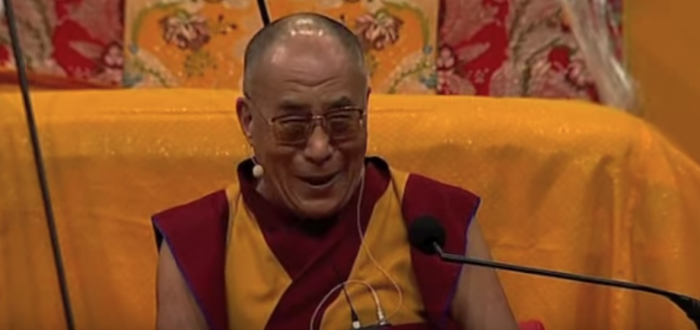Would you rather be right or happy? I have no question that my answer is the latter.
Being right is about justifying, explaining and wasting your living time and energy on trying to get people to agree with you, or trying to get people to change.
It’s also about thinking that if someone in your life would just act differently, you’d be happy.
But we can, at any given moment, choose happiness no matter what someone else is doing or saying—and no matter what circumstances we face. When we are being who we truly are and leaning into loving thinking, then happiness arrives.
In The Art of Happiness, the Dalai Lama and co-author psychologist Howard Cutler say that being happy is not a selfish, self-centered, or self-indulgent goal: “Survey after survey has shown that happy people are more sociable, flexible, and creative…and are found to be more loving and forgiving than unhappy people.”
The Dalai Lama—who lost his country to some of the most brutal violence in modern day history—believes that being happy should be our central goal because it is unhappy people who disrupt others’ lives at the minimum, and at extremes do destructive things like start wars.
I’ve always felt deep down that happiness was crucial to me personally but also for larger reasons. Now I understand why.
There are so many critiques of pursuing happiness that argue that it’s “fluffy” and self-involved and unrealistic.
I’ve been called a Pollyanna more than once in my life. I’ve also been accused of not being a deep thinker because I tend toward the positive (funny, because the Dalai Lama is one of the deepest, most contemplative thinkers around, and he promotes the “art of happiness”).
But what I understand now is that the discipline of happiness is not about denying our negative feelings. Instead, it’s using our negative feelings to recognize—as the Dalai Lama puts it—the ways in which negative feelings point us in the wrong direction. The key is to note those feelings and then lean into something more neutral or positive.
One way to do this is to look at what we appreciate around us, what we are grateful for.
We cannot be compassionate without being fundamentally happy because if we look at the ills of the world through the lens of anger, we perpetuate anger and violence.
If we are happy, we are peaceful and kind, and we are more effective at creating solutions.
Happiness, says the Dalai Lama, can change the world.
There have been times in my life when I’ve been miserable, such as when I’ve been stuck in the “wrong” job or “wrong” relationship.
Now that I look at those situations from a distance, though, I can see in each case how I had put a lot of energy into making those jobs, relationships and other “unfortunate” situations happen.
I’d worked hard to set the stage for those things. I’d gotten the “right” education, put myself in situations to meet the “right people,” and cultivated the “right” disposition to bring those things into my life—and then when it was clear they weren’t working, I spent a lot of my living time thinking about what was wrong, complaining about what was wrong, rallying the troops about what was wrong.
All of that was energy that entrenched me into my unhappy situation. It made me “right” not happy.
Now I see that if I think more about what I want (not what I don’t want), if I focus on solutions rather than hammering away at problems, if I appreciate the positive aspects of my life, then those things proliferate.
It makes sense, doesn’t it? Whatever we spend our thinking and living time on multiplies like rabbits.
At the heart of my happiness is a certain tenderness I feel toward the human condition. Much of that, actually, has been borne from suffering: loss of my parents and other beloveds, my battle with a brain tumor, a brutal divorce.
I could rail against these things. I could be bitter and angry. I could dig into a desire to be right—right about how the world is a f*cked up, unfair place.
Yet, with happiness as my goal, difficult life experiences open me up to deeper compassion—and ultimately to richer happiness.
This happiness allows me to be of service to others (unlike unhappiness, anger, and the obsession with “being right”).
I’d rather be happy than right. And it’s everyone’s right to be happy.
~
Author: Kate Evans
Editor: Caroline Beaton
Image: YouTube still









Read 1 comment and reply